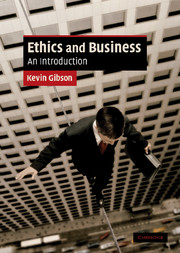Book contents
2 - Insights from ethical theory
Published online by Cambridge University Press: 05 June 2012
Summary
Gleaning at the grocery
Owen Bedborough was working his way through college with a part-time job in a grocery store, part of a highly profitable national chain. He did not expect to encounter any moral dilemmas, but as the weeks went on he became more and more troubled. Some of the staff would purchase food for their breaks, but the checker would not scan all the items. When he mentioned it to one of his coworkers, he was told that it was one of the unofficial perks of working for barely more than minimum wage. She also pointed out that it was quite routine for staff to use their company discount for friends and family, and that he would hurt a lot of people if he reported it any further. He also noticed that customers near the fruit would sometimes sample grapes directly from the display, and some would go as far as to eat a small bunch before returning the stalk to the shelf. He relayed his concern to the shift manager; he was instructed to ignore it unless the person looked homeless, and then to call security. When he worked at the checkout, he would sometimes be given government food stamps for cola drinks and prepackaged candy. He wanted to tell the customers they would be much better off using them for healthy food, but said nothing. However, the main moral dilemma he faced involved the store policy of disposing of meat that had reached its sell-buy date.
- Type
- Chapter
- Information
- Ethics and BusinessAn Introduction, pp. 27 - 52Publisher: Cambridge University PressPrint publication year: 2007



